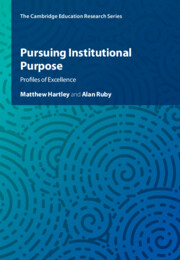Acknowledgments
Our exploration of institutional excellence has been supported by many colleagues and friends. We are deeply indebted to the people who work at the eight institutions we profiled. We are grateful for their warm welcome and for the great gifts of time. We have been deeply inspired by the dedication they bring to their work. Without them there would be no cases for us to draw on and to examine. In a real sense, their collective insights about excellence constitute the central contribution of this book.
We also thank our colleagues at the University of Pennsylvania’s Graduate School of Education (Penn GSE) who have encouraged us and offered invaluable advice. We have benefited from the insights of students who took our graduate seminar on conceptions of excellence and who joined us in examining institutional documents, interview transcripts, and draft cases in order to understand these institutions better. We have been encouraged by the thoughtful comments of faculty colleagues who offered advice along the way.
We deeply appreciate the resources afforded us by virtue of our teaching and researching at Penn GSE, which offered us the time and the seed funding for this project. We are also indebted to the Qatar Foundation for a substantial grant that enabled us to visit several institutions and provided material research support. We benefited greatly from presenting early findings on this work at the 2019 WISE Summit with Ahmed Baghdady, (then) Manager for Research and Content Development at the Qatar Foundation, who is a coauthor of the chapter on Qatar University. We appreciate his guidance and contributions. We also wish to acknowledge the support and assistance of Stavros Yiannouka, the chief executive of the Foundation.
One of the greatest pleasures of this project has been working closely with doctoral students who were key members of our research team. Most notably we thank Elizabeth Dunens whose logistical support kept us on task despite other challenges that distracted our efforts (including a global pandemic). We also appreciate her intellectual contributions and prodigious skills as a qualitative researcher, which is evident in the University of Maryland, Baltimore County case, of which she is a coauthor. We benefited from the contributions of Irina Eremenko, who helped in the development of the protocol used for the School of Advanced Studies, University of Tyumen case, and conducted the interview, in Russian, with the president of Tyumen University. We also appreciate the contributions of Joyce Kim to our regular research meetings. Astrid Pickenpack conducted a series of interviews, in Spanish, with the faculty members at Pontificia Universidad Católica de Chile and helped clarify historical and contextual issues we did not understand, and for this we are most grateful. We also thank Emily Eckhardt, a master’s student at Penn GSE, who conducted early interviews for us with colleagues at the Asian University for Women, where she had worked previously.
We have benefited from conversations with many academic colleagues from around the world who have offered guidance and encouragement as we framed our study. These include Geoff Hayward, former head of the University of Cambridge’s Faculty of Education, and Colleen McLaughlin, former deputy head of that same institution. We acknowledge the support of Christopher Morphew, dean of Johns Hopkins School of Education; Jonathan Jansen of Stellenbosch University; and Nirmala Rao, former vice chancellor of Asian University for Women. Jane Knight wrote to us with advice from San Miguel de Allende in the mountains of Mexico. Philip Altbach from Boston College and S. Gopinathan, former dean of Nanyang Technological University, Singapore, helped us better understand the current state of higher education across Asia and provided helpful inputs about particular universities.
We are also indebted to our Penn GSE colleague Jennifer Moore, whose exemplary editorial skills helped smooth the narrative arc of nearly every chapter in this book.
While we were assisted and supported by all these people, and many others, any errors and omissions are entirely ours. These cases represent our interpretations based on our distinct personal histories and our experiences of working and traveling together over the years. The central nature of qualitative work is that the researcher is the instrument, and we are most certainly mindful of our limitations. Nevertheless, one of the most gratifying moments in this journey was reading the comments of those at the institutions who reviewed drafts of their case, many of whom expressed their appreciation of our efforts to give voice to their work and to tell their story. We are grateful, too, for their thoughtful editorial comments and have endeavored to address them.
Finally, we acknowledge and thank our respective partners, Jennie and Eileen, who endured our long days of travel, welcomed us home, and listened to our many musings about purpose and what makes a place matter. Their encouragement and support made this work possible.

